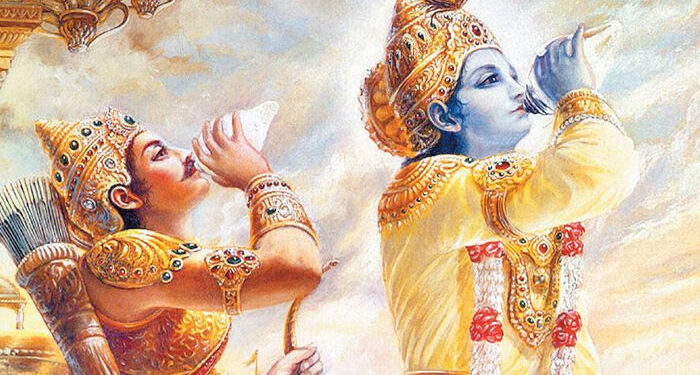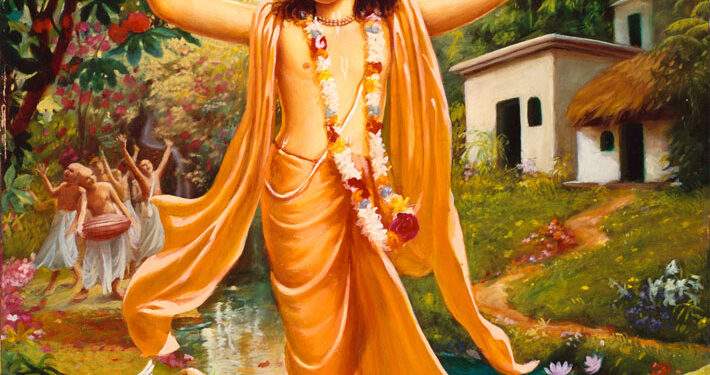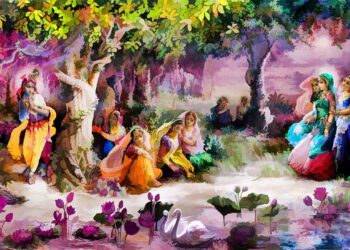TEXT 3
klaibyaṁ mā sma gamaḥ pārtha
naitat tvayy upapadyate
kṣudraṁ hṛdaya-daurbalyaṁ
tyaktvottiṣṭha parantapa
SYNONYMS
klaibyam—impotence; mā sma—do not; gamaḥ—take to; pārtha—O son of Pṛthā; na—never; etat—this; tvayi—unto you; upapadyate—is befitting; kṣudram—petty; hṛdaya—of the heart; daurbalyam—weakness; tyaktvā—giving up; uttiṣṭha—get up; param—tapa—O chastiser of the enemies.
TRANSLATION
O son of Pṛthā, do not yield to this degrading impotence. It does not become you. Give up such petty weakness of heart and arise, O chastiser of the enemy.
PURPORT
Arjuna was addressed as the son of Pṛthā, who happened to be the sister of Kṛṣṇa’s father Vasudeva. Therefore Arjuna had a blood relationship with Kṛṣṇa. If the son of a kṣatriya declines to fight, he is a kṣatriya in name only, and if the son of a brāhmaṇa acts impiously, he is a brāhmaṇa in name only. Such kṣatriyas and brāhmaṇas are unworthy sons of their fathers; therefore, Kṛṣṇa did not want Arjuna to become an unworthy son of a kṣatriya. Arjuna was the most intimate friend of Kṛṣṇa, and Kṛṣṇa was directly guiding him on the chariot; but in spite of all these credits, if Arjuna abandoned the battle he would be committing an infamous act. Therefore Kṛṣṇa said that such an attitude in Arjuna did not fit his personality. Arjuna might argue that he would give up the battle on the grounds of his magnanimous attitude for the most respectable Bhīṣma and his relatives, but Kṛṣṇa considered that sort of magnanimity mere weakness of heart. Such false magnanimity was not approved by any authority. Therefore, such magnanimity or so-called nonviolence should be given up by persons like Arjuna under the direct guidance of Kṛṣṇa.
TEXT 4
arjuna uvāca
kathaṁ bhīṣmam ahaṁ saṅkhye
droṇaṁ ca madhusūdana
iṣubhiḥ pratiyotsyāmi
pūjārhāv ari-sūdana
SYNONYMS
arjunaḥ uvāca—Arjuna said; katham—how; bhīṣmam—Bhīṣma; aham—I; saṅkhye—in the fight; droṇam—Droṇa; ca—also; madhu—sūdana—O killer of Madhu; iṣubhiḥ—with arrows; pratiyotsyāmi—shall counterattack; pūjā-arhau—those who are worshipable; ari—sūdana—O killer of the enemies.
TRANSLATION
Arjuna said: O killer of enemies, O killer of Madhu, how can I counterattack with arrows in battle men like Bhīṣma and Droṇa, who are worthy of my worship?
PURPORT
Respectable superiors like Bhīṣma the grandfather and Droṇācārya the teacher are always worshipable. Even if they attack, they should not be counterattacked. It is general etiquette that superiors are not to be offered even a verbal fight. Even if they are sometimes harsh in behavior, they should not be harshly treated. Then, how is it possible for Arjuna to counterattack them? Would Kṛṣṇa ever attack His own grandfather, Ugrasena, or His teacher, Sāndīpani Muni? These were some of the arguments offered by Arjuna to Kṛṣṇa.
TEXT 5
gurūn ahatvā hi mahānubhāvān
śreyo bhoktuṁ bhaikṣyam apīha loke
hatvārtha-kāmāṁs tu gurūn ihaiva
bhuñjīya bhogān rudhira-pradigdhān
SYNONYMS
gurūn—the superiors; ahatvā—not killing; hi—certainly; mahā—anubhāvān—great souls; śreyaḥ—it is better; bhoktum—to enjoy life; bhaikṣyam—by begging; api—even; iha—in this life; loke—in this world; hatvā—killing; artha—gain; kāmān—desiring; tu—but; gurūn—superiors; iha—in this world; eva—certainly; bhuñjīya—one has to enjoy; bhogān—enjoyable things; rudhira—blood; pradigdhān—tainted with.
TRANSLATION
It would be better to live in this world by begging than to live at the cost of the lives of great souls who are my teachers. Even though desiring worldly gain, they are superiors. If they are killed, everything we enjoy will be tainted with blood.
PURPORT
According to scriptural codes, a teacher who engages in an abominable action and has lost his sense of discrimination is fit to be abandoned. Bhīṣma and Droṇa were obliged to take the side of Duryodhana because of his financial assistance, although they should not have accepted such a position simply on financial considerations. Under the circumstances, they have lost the respectability of teachers. But Arjuna thinks that nevertheless they remain his superiors, and therefore to enjoy material profits after killing them would mean to enjoy spoils tainted with blood.


















